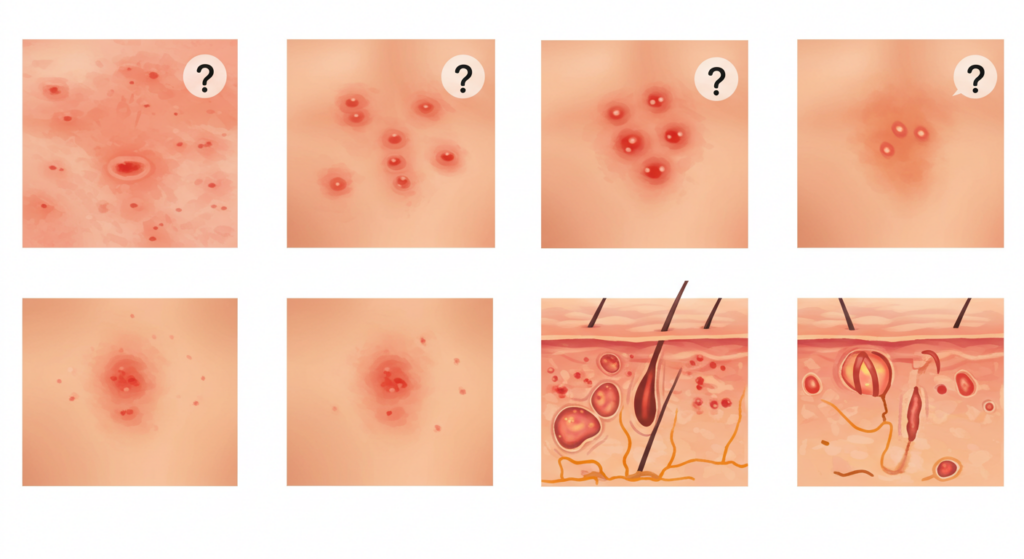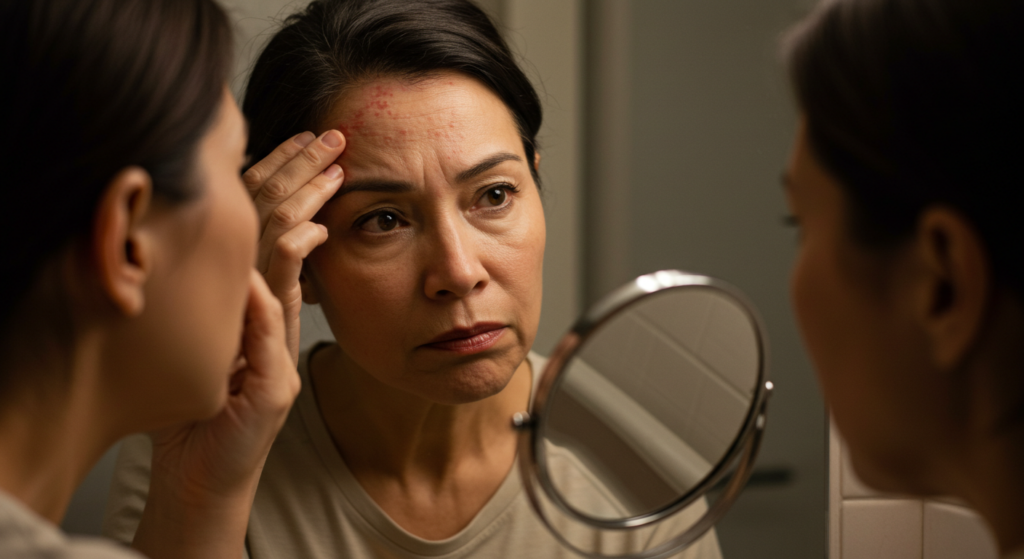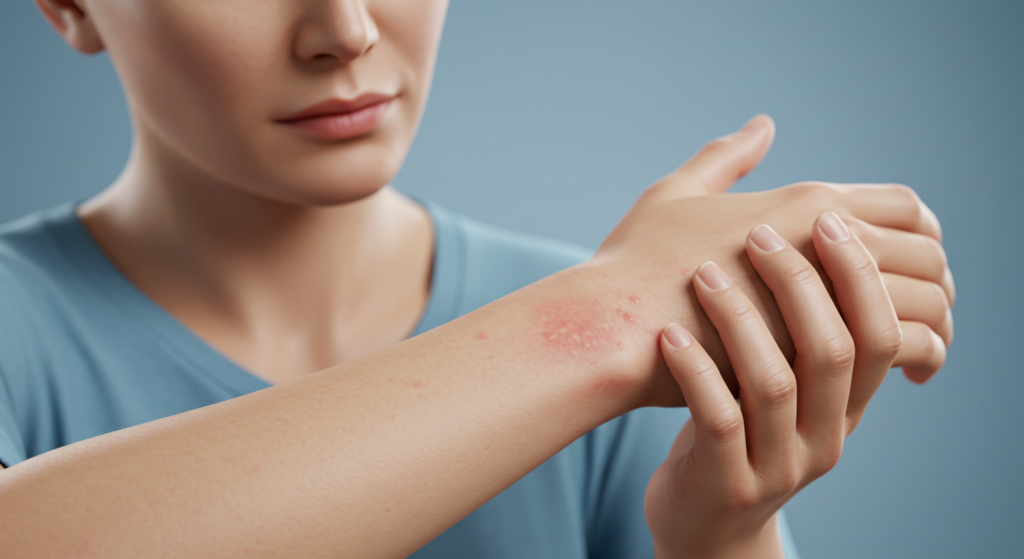Las reacciones alérgicas se manifiestan de diversas maneras, siendo las erupciones cutáneas un síntoma común y a menudo visible. Si bien muchas erupciones son leves y se resuelven por sí solas, algunas pueden indicar una reacción alérgica grave que requiere atención médica inmediata. Este artículo le ayudará a comprender las reacciones alérgicas, identificar síntomas preocupantes y saber cuándo buscar ayuda profesional.

Comprender las reacciones alérgicas
Una reacción alérgica ocurre cuando el sistema inmunitario identifica erróneamente una sustancia inofensiva (alérgeno) como una amenaza. Esto desencadena la liberación de histamina y otras sustancias químicas, lo que provoca diversos síntomas. Los alérgenos pueden variar desde sustancias comunes como el polen y la caspa de mascotas hasta alimentos, medicamentos y picaduras de insectos. La gravedad de una reacción alérgica puede variar considerablemente, desde una picazón leve hasta una anafilaxia potencialmente mortal.
La respuesta del organismo a un alérgeno es compleja e involucra varios componentes del sistema inmunitario. Los anticuerpos IgE desempeñan un papel crucial, uniéndose a los alérgenos y provocando que los mastocitos liberen histamina. Esta liberación de histamina causa los síntomas característicos de las reacciones alérgicas, como inflamación, hinchazón y picazón. Comprender este proceso ayuda a reconocer los signos y predecir la posible gravedad.
Algunas reacciones alérgicas son inmediatas y ocurren a los pocos minutos de la exposición al alérgeno. Otras, conocidas como reacciones de hipersensibilidad retardada, pueden tardar horas o incluso días en desarrollarse. El tiempo que tardan en aparecer los síntomas puede ser una pista útil para identificar la causa. Conocer su historial alérgico y los posibles desencadenantes es crucial para controlar y prevenir futuras reacciones.
La gravedad de una reacción alérgica depende de varios factores, como el tipo y la cantidad de alérgeno, la sensibilidad del individuo y la vía de exposición (p. ej., ingestión, inhalación, contacto con la piel). Una reacción leve puede presentar solo síntomas localizados, como una erupción cutánea, mientras que una reacción grave puede afectar a varios sistemas orgánicos, causando dificultad para respirar, hipotensión y pérdida del conocimiento.

Síntomas comunes de erupción cutánea
Las erupciones cutáneas asociadas a reacciones alérgicas pueden presentarse de diversas formas, desde enrojecimiento y picazón leves hasta urticaria generalizada y ampollas. Los síntomas comunes incluyen enrojecimiento, hinchazón, picazón y protuberancias o ronchas (urticaria o ronchas). La erupción puede localizarse en la zona de contacto con el alérgeno o extenderse por todo el cuerpo.
La apariencia del sarpullido puede variar según el alérgeno y la respuesta individual. Algunos sarpullidos pueden aparecer como pequeñas manchas rojas, mientras que otros pueden ser más grandes, estar más inflamados y acompañados de ampollas o lesiones con líquido. La textura también puede variar, desde lisa y plana hasta áspera y escamosa. El picor es un síntoma muy común y puede ser muy molesto.
Ciertas erupciones cutáneas, como la dermatitis de contacto, se localizan en la zona de la piel que entró en contacto con el alérgeno. Esto suele observarse en reacciones a plantas (hiedra venenosa), productos químicos o ciertos tejidos. Otras erupciones, como la urticaria, pueden ser generalizadas y aparecer en cualquier parte del cuerpo. La distribución y el patrón de la erupción pueden dar pistas sobre la posible causa.
Preste atención a cualquier síntoma que acompañe a la erupción. Fiebre, dificultad para respirar, hinchazón de la cara o la garganta, mareos o náuseas pueden indicar una reacción alérgica más grave y requerir atención médica inmediata. Lleve un registro detallado de la apariencia, la ubicación y cualquier otro síntoma de la erupción.
Cuándo buscar atención médica
Busque atención médica inmediata si experimenta cualquier signo de una reacción alérgica grave, como dificultad para respirar, hinchazón de la cara, los labios o la lengua (angioedema), mareos o taquicardia. Estos síntomas pueden indicar anafilaxia, una afección potencialmente mortal que requiere tratamiento inmediato con epinefrina.
Si la erupción es extensa, se acompaña de inflamación significativa o causa molestias intensas, es recomendable buscar atención médica. Las erupciones persistentes que no mejoran después de unos días o que empeoran a pesar del tratamiento casero también justifican una visita al médico. Esto es especialmente cierto si la erupción se acompaña de fiebre u otros síntomas sistémicos.
Si sospecha una reacción a un nuevo medicamento o alimento, contacte a su médico o alergólogo inmediatamente. Un diagnóstico preciso es crucial para controlar futuras exposiciones. Su médico podría realizarle una exploración física, revisar su historial médico y posiblemente solicitar pruebas de alergia para identificar el alérgeno específico.
No dude en consultar a un médico si tiene dudas sobre la causa o la gravedad de una erupción cutánea. La intervención temprana puede prevenir complicaciones y garantizar un tratamiento adecuado. Un profesional de la salud puede diagnosticar con precisión la causa de la erupción y recomendar el plan de tratamiento más eficaz.
Prevención de reacciones futuras
Identificar y evitar los alérgenos es la manera más eficaz de prevenir futuras reacciones alérgicas. Lleve un registro detallado de sus síntomas, incluyendo la hora de aparición, las posibles exposiciones y cualquier otro síntoma asociado. Esta información puede ser invaluable para ayudar a su médico a identificar el alérgeno.
Las pruebas de alergia pueden ayudar a identificar los alérgenos específicos que desencadenan sus reacciones. Estas pruebas pueden incluir pruebas cutáneas o análisis de sangre para medir los niveles de anticuerpos IgE. Una vez identificados los alérgenos, se pueden implementar estrategias de prevención. Esto puede incluir eliminar ciertos alimentos de la dieta, evitar ciertos entornos o usar equipo de protección.
Los antihistamínicos de venta libre pueden ayudar a controlar reacciones alérgicas leves, como picazón y urticaria. Sin embargo, no son eficaces para reacciones graves y no deben sustituir la atención médica. Siga siempre las instrucciones de la etiqueta del medicamento y consulte a un médico si los síntomas persisten o empeoran.
Considere llevar consigo un autoinyector de epinefrina (como un EpiPen) si tiene antecedentes de reacciones alérgicas graves. Este medicamento vital puede ayudar a contrarrestar los efectos de la anafilaxia. Es fundamental capacitarse regularmente en el uso del autoinyector. Las revisiones periódicas con su alergólogo o médico son esenciales para controlar y monitorear sus alergias.
Las erupciones cutáneas pueden ser un síntoma común de reacciones alérgicas, desde leves hasta graves. Comprender los signos y síntomas, saber cuándo buscar atención médica e implementar estrategias preventivas es crucial para controlar las reacciones alérgicas y garantizar su bienestar. Si le preocupa una erupción cutánea o una reacción alérgica, consulte con un profesional de la salud para obtener un diagnóstico preciso y el tratamiento adecuado.
Descubra la experiencia de la Dra. Ebru Okyay, su médico de confianza. dermatólogo en AntalyaYa sea que esté buscando abordar problemas médicos de la piel o mejorar su belleza natural con tratamientos cosméticos, el Dr. Okyay está aquí para ayudarlo. Con atención personalizada y técnicas avanzadas, lograr sus objetivos para la piel nunca ha sido tan fácil.
